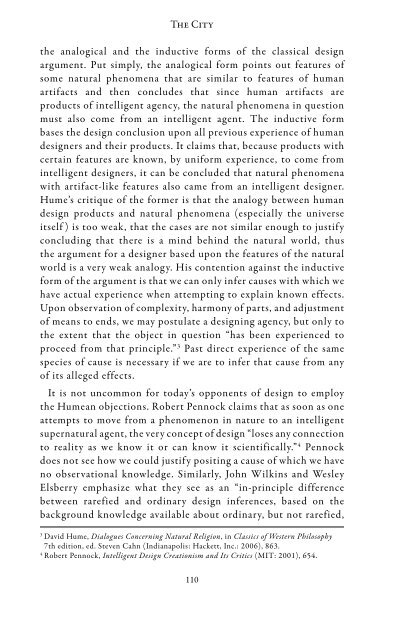THE CITY
h6c7p5d
h6c7p5d
Create successful ePaper yourself
Turn your PDF publications into a flip-book with our unique Google optimized e-Paper software.
The City<br />
the analogical and the inductive forms of the classical design<br />
argument. Put simply, the analogical form points out features of<br />
some natural phenomena that are similar to features of human<br />
artifacts and then concludes that since human artifacts are<br />
products of intelligent agency, the natural phenomena in question<br />
must also come from an intelligent agent. The inductive form<br />
bases the design conclusion upon all previous experience of human<br />
designers and their products. It claims that, because products with<br />
certain features are known, by uniform experience, to come from<br />
intelligent designers, it can be concluded that natural phenomena<br />
with artifact-like features also came from an intelligent designer.<br />
Hume’s critique of the former is that the analogy between human<br />
design products and natural phenomena (especially the universe<br />
itself ) is too weak, that the cases are not similar enough to justify<br />
concluding that there is a mind behind the natural world, thus<br />
the argument for a designer based upon the features of the natural<br />
world is a very weak analogy. His contention against the inductive<br />
form of the argument is that we can only infer causes with which we<br />
have actual experience when attempting to explain known effects.<br />
Upon observation of complexity, harmony of parts, and adjustment<br />
of means to ends, we may postulate a designing agency, but only to<br />
the extent that the object in question “has been experienced to<br />
proceed from that principle.” 3 Past direct experience of the same<br />
species of cause is necessary if we are to infer that cause from any<br />
of its alleged effects.<br />
It is not uncommon for today’s opponents of design to employ<br />
the Humean objections. Robert Pennock claims that as soon as one<br />
attempts to move from a phenomenon in nature to an intelligent<br />
supernatural agent, the very concept of design “loses any connection<br />
to reality as we know it or can know it scientifically.” 4 Pennock<br />
does not see how we could justify positing a cause of which we have<br />
no observational knowledge. Similarly, John Wilkins and Wesley<br />
Elsberry emphasize what they see as an “in-principle difference<br />
between rarefied and ordinary design inferences, based on the<br />
background knowledge available about ordinary, but not rarefied,<br />
3<br />
David Hume, Dialogues Concerning Natural Religion, in Classics of Western Philosophy<br />
7th edition, ed. Steven Cahn (Indianapolis: Hackett, Inc.: 2006), 863.<br />
4<br />
Robert Pennock, Intelligent Design Creationism and Its Critics (MIT: 2001), 654.<br />
110


